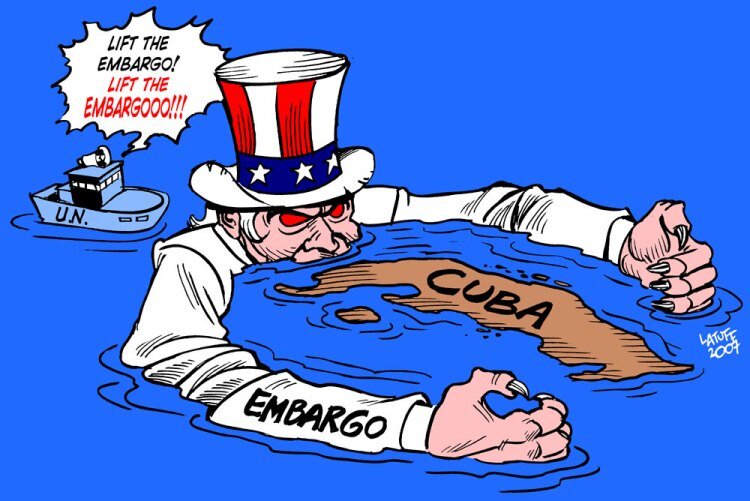The Cuban Embargo and Black America
Cuba has been in the news a lot lately. News-cameras cannot stray from the demonstrations in the streets of Cuba aimed at addressing the lack of medicine, food and vaccines on the island. It is no secret the Covid 19 pandemic has harmed much of the world economy, but for Cuba, it has exacerbated an existing economic crisis stretching back more than 60 years. In 1960 following the overthrow of the U.S. backed dictator Fulgencio Batista by the Cuban people and the ascendancy of the Fidel Castro and the Cuban Revolution, the United States retaliated by stopping all trade with the island, and penalizing those nations that do. This became known as the “Cuban Embargo”. Food, medicine, building materials were all barred from entering the island, making Cuba enter the ranks of the “Eastern world” such as the former Soviet Union, Easter Germany and China, nations that were not afraid to violate U.S. foreign initiatives. This is where much of Cuba as the “Bad guy” stems from within American media coverage.
Cartoon detailing the reality of the Cuban Embargo
The Cuban Revolution was the vehicle of progressive social change on an Island that had previously been run by American corporations. Fidel Castro and the Cuban Revolution brought literacy, education, employment and healthcare to millions who had previously never been able to read or see a doctor in their entire lives, the majority of whom where Afro-Cubans. The enormous leaps in social change made by Cuba in such a short period of time made the island extremely attractive to activists, intellectuals and working class people all over the world, particularly in Black America.
Afro-Cuban boy celebrating
Within the HistoryMakers Digital archive I started my search for opinions on Cuba and the Revolution by searching “Cuba” in the Keyword Search feature. I came to an interview with Mr. James Early, a cultural administrator who has worked for the Smithsonian and the National Endowment for the Humanities, and in his interview he provided a resonating perspective on Cuba. He says “Cuba was very important for a lot of people in my generation” as it “…spurred the imagination… this was exciting. It, it, it gave us hope and it stimulated our imagination and, and, and the sense of what we, too, could contribute to changes in society”. Black Americans during the time of the 1960s where no stranger to the harsh repression and ire of the United States government, and naturally had a curiosity and sense of solidarity with a non-white nation capable of providing for their people, all while being able to shake the economic domination of the United States.
Fidel Castro and Angela Davis
Cuba, despite the Embargo during the period of the Cold War, was able to provide for their own people via free access to housing, education and healthcare, strongly resonating necessities to Black Americans who make due with the worst access to these basics of life in a nation that makes necessities a profitable commodity. Cuba was a living example of a viable alternative to American society ripe with racial issues and high costs of living expenses.
Cuba opposed to supporting a vast military industrial complex, like in the United States, supported the construction of a vast medical industrial complex, capable of healing and training doctors from all over the world, for little to no cost to themselves. The expertise of Cuba’s medical program and Cuba’s attitude of public service is commented on by The honorable justice Shelvin Louise Hall in an interview within the digital archive. Justice Hall recounts being part of a delegation to Cuba and meeting then President Fidel Castro stating that “we went to Cuba and met Fidel [Castro] because he wanted to get the doctors in Houston [Texas] connected with the--and get medicine to the healthcare system in Cuba because Cuba has a very fine system but in terms of the medicines and to share their programs”. Justice Hall was interested in building links between Cuba and Black America, to train Black American doctors in medicine so on their return they can serve their communities. This model of educating the less fortunate of the world was nothing new for the Cuban government as reflected on by Justice Hall when she recounts her trip to Cuba’s Isla de la Juventud stating “…this is where they had taken children from various African and third world countries and they had a school for all of them, their own separate schools and they were educating them”.
Justice Shelvin Louise Hall
At the time of Justice Hall’s visit to Cuba was undergoing its the beginnings of its greatest economic crisis to date, more devastating in scale than the Great Depression of the 1930s. However, despite this great growing catastrophe she was able to see the Cuban system at work, educating the poor of the world and granting access to basic services that would be considered luxurious in the United States.
Nelson Mandela and Fidel Castro celebrating the end of Apartheid
Cuba’s achievements in the service of Black people across the world is no secret - lending support to the liberation movements in Angola, Mozambique and Guinea-Bissau. Cuba helped to destroy South African apartheid and sends doctors all over the world to service those most in need, almost exclusively to nations from the global south. This is why Black Americans owe Cuba a service, a debt to be repaid. We as a people should demand an end to the U.S. embargo on Cuba that leaves many in Cuba without ease access to food and medicines, and relieve the Cuban government of meeting these needs with both hands tied behind their back by a U.S. system designed to make them suffer.





